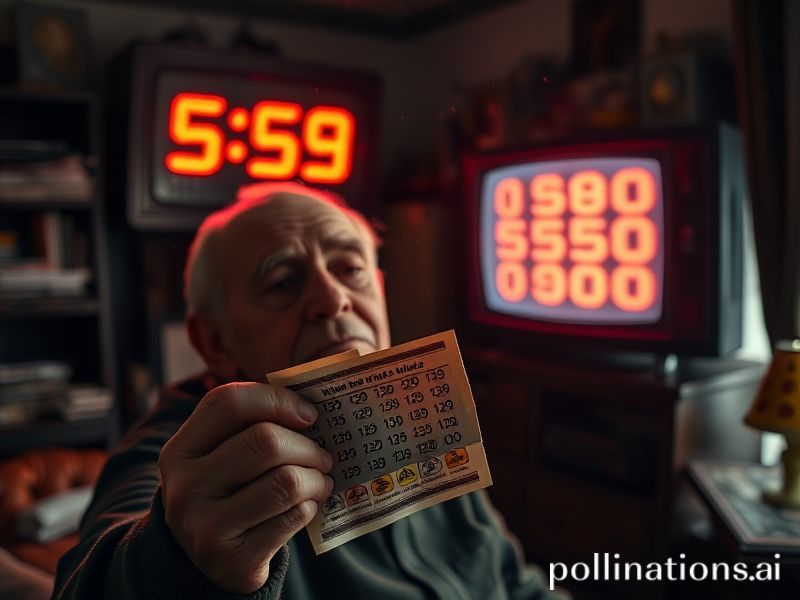Global Jackpot Fever: How Six Plastic Balls Just Out-Performed Every GDP on Earth
Tonight, in a windowless studio somewhere between a tax haven and a tax headache, six plastic balls tumbled out of a glorified popcorn machine and rewrote destinies from Lagos to Ljubljana. The numbers—3, 17, 24, 33, 41, with a “bonus” 7 that looked suspiciously like an afterthought—have already been translated into 47 languages, meme-ified in Tagalog, and parsed by crypto-bros in Tallinn who swear the sequence secretly encodes tomorrow’s Bitcoin price. For the 0.0000003 percent of humanity whose tickets matched, champagne corks are popping in gated compounds; for the rest, the same corks are being retrieved from the trash to plug leaks in the roof.
On paper, lotteries are the purest form of globalization: a borderless tax on hope priced in dollars, euros, naira, or, if you’re feeling nostalgic, Venezuelan bolívars. But scratch the foil and you’ll find every nation has added its own regional spice. In the United States, Powerball jackpots are marketed like summer blockbusters—this week’s “$1.2 billion spectacular” featured its own trailer and a soundtrack suspiciously similar to a Marvel film. Across the pond, Italy’s SuperEnalotto keeps things baroque: winners receive not just cash but a courtesy call from a cardinal who reminds them that God, too, enjoys a flutter. Meanwhile, China’s Welfare Lottery funds social programs with the same enthusiasm a teenager funds his nicotine habit: technically helping, spiritually hollow.
The numbers themselves are geopolitical Rorschach tests. In Manila, cab drivers play 17 because it’s the date of the People Power Revolution; in Moscow, oligarchs avoid 24 because two-four sounds too much like “too poor.” The global diaspora of WhatsApp aunties forwards chain messages claiming tonight’s sequence was prophesied by a blind monk in the Caucasus, conveniently ignoring that the same monk also predicted the world would end in 1998. Statistical literacy, like dental floss, remains a niche pursuit.
Of course, the real lottery is watching governments pretend the proceeds fund education and park benches rather than the legal fees of legislators caught embezzling education-and-park-bench funds. Spain’s El Gordo—the “Fat One”—distributes its winnings so widely that entire villages momentarily experience Scandinavian levels of trust before reverting to the Iberian default of siesta and suspicion. In Australia, where lotteries are pitched as mateship incarnate, syndicates in mining towns win so often that conspiracy theorists insist the kangaroos are in on it.
And then there are the ripple effects economists politely call “externalities.” Crypto exchanges in Singapore list lottery tokens pegged to tonight’s draw, allowing armchair numerologists to short the number 13 like it’s a failing bank. In Nairobi, M-Pesa agents report a 400-percent spike in micropayments from users who believe buying 0.0001 of a ticket still counts as manifesting abundance. Even the Taliban, sworn enemies of vice, run an underground “Kabul Cash”—because nothing says ideological consistency like rocket launchers funded by scratch cards.
The darkest irony? The poorer the country, the shinier the lottery’s promise. Haiti’s new “Loto Nasyonal” advertises itself as “the fastest route out of the hemisphere,” which is technically true if you consider drowning in the Mona Passage a route. Meanwhile, Silicon Valley visionaries—who already won the ovarian lottery by being born in Palo Alto—now day-trade lottery futures between Pilates classes, proving that capitalism can, in fact, create a derivative of hope itself.
As dawn breaks over the international dateline, the winning ticket is already being authenticated by a consortium of auditors whose last joint project was inflating the GDP of Cyprus. The anonymous winner—let’s call them “Patriot A.”—will shortly discover that anonymity lasts exactly until the cousin who once lent them cab fare remembers their childhood nickname. Financial advisers from Zurich to the Caymans are warming up their jets, each carrying a briefcase with two plans: Plan A for modest wealth, Plan B for “Why not buy a small island nation?”
And so the planet spins, powered less by tectonic plates than by the perpetual motion of human credulity. Somewhere, a new jackpot is already ticking upward, its neon digits brighter than any climate-change warning. Because in the end, the only thing more renewable than solar panels is the human capacity to believe that six plastic balls might love us back.







